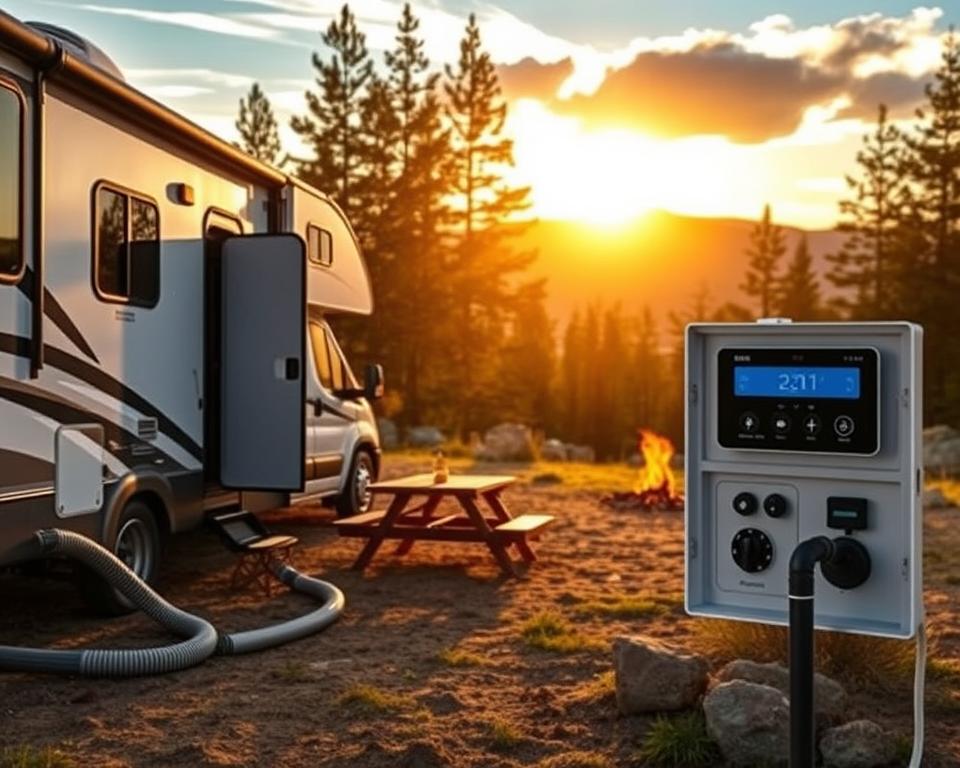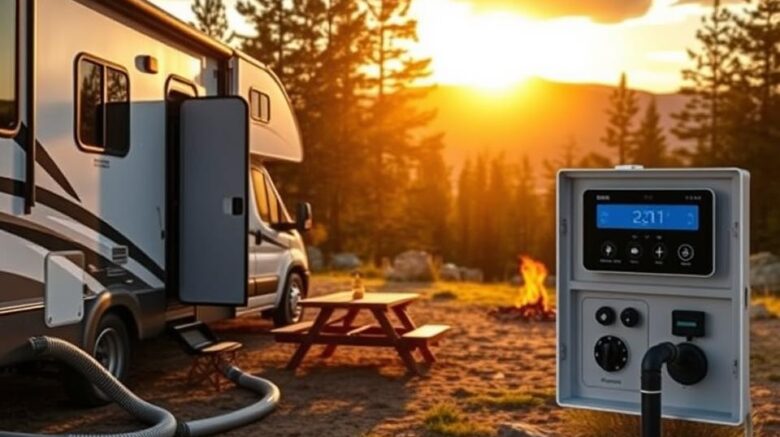RV Tank Emptying: Your Guide to Straightforward Disposal
Ever wondered how your motorhome processes waste during outdoor getaways? Proper tank emptying is vital, more than you might suspect. Ensuring your rig’s sanitation system functions properly is essential for trouble-free trips. This guide explains RV waste systems, the need for septic pumping, and best practices for carefree adventures. With RV sewer pumping service services from All in Sanitation, your trips can be as splendid as your destinations.
Main Takeaways
- Grasping RV sewage setups is essential for proper tank emptying.
- Routine tank emptying avoids unexpected issues on the road.
- Best practices can extend the life of your RV’s plumbing system.
- Count on All in Sanitation for trustworthy camper tank services.
- Timing your pumping prevents headaches at campsites.
- Proper wastewater disposal is key to responsible RV ownership.
Understanding RV Waste Systems
On-the-go waste setups in RVs play a vital role in sanitation. These systems typically comprise black and gray water storage. The black tanks collect toilet waste. Meanwhile, gray tanks deal with wastewater from sinks and showers. Understanding how each tank works enhances your disposal process.
Proper upkeep of these components is crucial. Failing to pump the camper tanks regularly may result in blockages. This could spoil your camping trips. Perform routine inspections to maintain optimal performance.
Relying on a reputable black water provider ensures correct dumping. Also, treatments tailored for RV systems can prolong tank life and avert bad smells. Proper care of your waste system boosts your RV experience significantly.
Why You Need Regular RV Septic Service
Regular RV septic pumping is vital for the hygiene and functionality of your motorhome. Neglecting wastewater management leads to foul smells, blockages, and system breakdowns. Accumulated waste poses health risks from bacteria. Thus, ongoing upkeep is indispensable.
Using a professional service like All in Sanitation ensures eco-friendly waste disposal. They handle your sewage with care and precision. Staying on top of septic servicing keeps your trips worry-free. It ensures your road trips remain enjoyable, avoiding the dangers of overlooked RV septic pumping.
How Often Should You Pump Your RV Septic?
How often you empty tanks influences your RV’s sanitation. Regular timing avoids travel interruptions. Your pumping schedule depends on occupancy, tank capacity, and usage patterns.
For occasional RV users, it’s best to pump the black water tank every 3-5 days. Full-time RV dwellers might need to pump more often due to more waste. Monitoring tank levels closely can improve your maintenance routine significantly.
Using tank treatments helps you gauge emptying times. Following these guidelines protects your sanitation apparatus. Preventing tanks from overflowing not only keeps your environment clean but also prolongs the plumbing lifespan of your RV.

RV Waste Emptying Techniques
RV owners have multiple dumping methods at their disposal. The macerating method employs a macerator pump creating a slurry for easier disposal. This facilitates easier disposal at dumping stations or designated areas. Its efficiency and convenience make it a popular choice.
Home septic dumping allows for emptying the RV’s holding tank directly into a residential septic system. It’s essential to verify local regulations to avoid non-compliance with waste disposal laws. This method is both environmentally safe and directly manages RV waste when properly used.
Gravity-fed dumping relies on height difference to empty tanks. All dumping options have advantages and drawbacks. Knowing the differences helps you pick the right approach for clean and efficient disposal.
RV Waste Disposal Tools
Effective RV septic pumping requires appropriate tools. A durable sewer hose links your RV to disposal sites. Flexibility and strength are crucial qualities. Quality hoses turn dumping into a quick task.
Macerator pumps are also essential in the equipment lineup. They convert solids into liquid for easier dumping. Ideal for low-lying dump points.
It’s crucial to maintain your RV septic pumping gear. Rinse equipment after every job to prevent buildup. Storing them neatly ensures they’re always ready for use. Well-maintained gear ensures clean and smooth emptying.
Optimal RV Waste System Care
Maintaining a clean and efficient RV waste system is crucial for a pleasant travel experience. Adhere to these tips for spotless sanitation. First empty black water, then use gray water to flush. This process uses the cleaner water to flush out the tanks, preventing clogs and buildup.
Choose enzyme or bacterial additives for superior breakdown. They maintain a balanced microbial ecosystem in your tanks. Avoid bleach or strong cleaners that harm your septic’s helpful microbes.
Consistently rinsing tanks, hoses, and connectors is key to avoiding odors and blockages. Employing a dedicated sewer hose for black water use is a wise choice. It minimizes contamination risks and aids in maintaining system cleanliness.
Follow this routine to streamline sewer cleaning:
- Dump black water first, then gray water.
- Apply microbial additives routinely.
- Steer clear of caustic cleaners.
- Clean equipment thoroughly each time.
- Inspect the system regularly for leaks or issues.
Following these steps, RV owners can improve the life span and functionality of their wastewater systems. This leads to more enjoyable road trip experiences.
Mobile Home Septic Maintenance
Maintaining your mobile home’s septic system is crucial for its longevity and efficiency, much like those in RV waste systems. Timely maintenance helps avoid costly fixes and downtime. A routine pump every 3–5 years suits most setups, based on usage and capacity.
Proper dumping techniques protect your septic infrastructure. Only introduce safe, approved substances into the system. Biodegradable solutions and level monitoring minimize harm. Steer clear of damaging cleaners that kill beneficial bacteria.
Scheduling regular professional inspections can catch potential problems early. These check-ups ensure your peace of mind by identifying issues before they worsen, thus maintaining smooth operation. Following these guidelines keeps your home septic in peak shape.
RV Trailer Sewage Handling Guidelines
Effective trailer wastewater disposal is essential for a smooth RV experience. Locate approved dumping spots before departure. Make sure these spots comply with local laws to avoid fines and environmental damage. Using camper-safe solutions boosts tank health and dumping ease.
Utilizing freshwater is crucial in the disposal process. Flushing tanks with water ensures complete emptying, averting the risk of waste residue. This residue can cause odors and blockages. Plus, it aligns with green practices.
Plan ahead for worry-free dumping. By organizing your stops at disposal stations as per your travel plans, you can reduce hassle. Coordination makes emptying more efficient. Some useful tips for waste disposal include:
- Regularly monitor tank levels to decide when pumping is needed.
- Apply enzyme or bacteria-based solutions to decompose waste and boost tank performance.
- Protect yourself with gloves and sanitization after handling equipment.
RV Tank Additives Explained
Your RV’s sanitation system depends on effective tank treatments. Formulations contain targeted microbes and enzymes. They aim to break down waste effectively. Using them regularly stops bad odors and ensures tanks stay clear, boosting overall performance.
Adding bio-treatments fosters a healthy septic ecosystem. Speeding up breakdown reduces tank buildup. Less frequent emptying prolongs service intervals.
When selecting an RV holding tank treatment, consider your motorhome’s requirements. Products vary significantly. Opt for green, home-compatible formulas. These choices maximize disposal efficiency and system health.
| Treatment Form | Active Ingredients | Advantages |
|---|---|---|
| Liquid Treatments | Bacteria and enzymes | Easy to use; effective waste breakdown |
| Powdered Solutions | Catalytic agents | Cost-effective; long shelf life |
| Compressed Tablets | Pre-measured cultures | Convenient; pre-measured dosages |
Common Mistakes to Avoid During Pumping
Campers often stumble on simple dumping mistakes. Skipping regular pumping leads to surprises. Resulting in overflow and malfunctions. Misusing cleaners harms beneficial bacteria. This often results in expensive repairs due to the disruption of system operations.
Another common mistake is not following the correct order when dumping tanks. Black-then-gray order matters most. Reversing the order invites leaks and smells. Avoid manual access to septic lids without professional help. Leave complex dumping tasks to experts for safety.
Ignoring tool upkeep invites equipment failures. Routine gear care supports clean, effective dumping. Avoiding these pitfalls simplifies your outdoor experience. It also ensures a cleaner and safer environment for everyone involved.
In Summary
An in-depth guide on RV septic pumping is vital for RV or mobile home owners. They pave the way for hassle-free travels. Regular maintenance and understanding your waste system can enhance your travels significantly. Employing correct methods and gear ensures stress-free camping.
Choosing All in Sanitation for septic services grants tranquility. Their professionalism guarantees that your wastewater management is in expert hands. Allowing you to focus on memories, not maintenance.
Routine tank emptying is fundamental to conscientious camping. It merges adventure with an odor-free, clean campsite. Ensuring every road trip remains clean and enjoyable.
